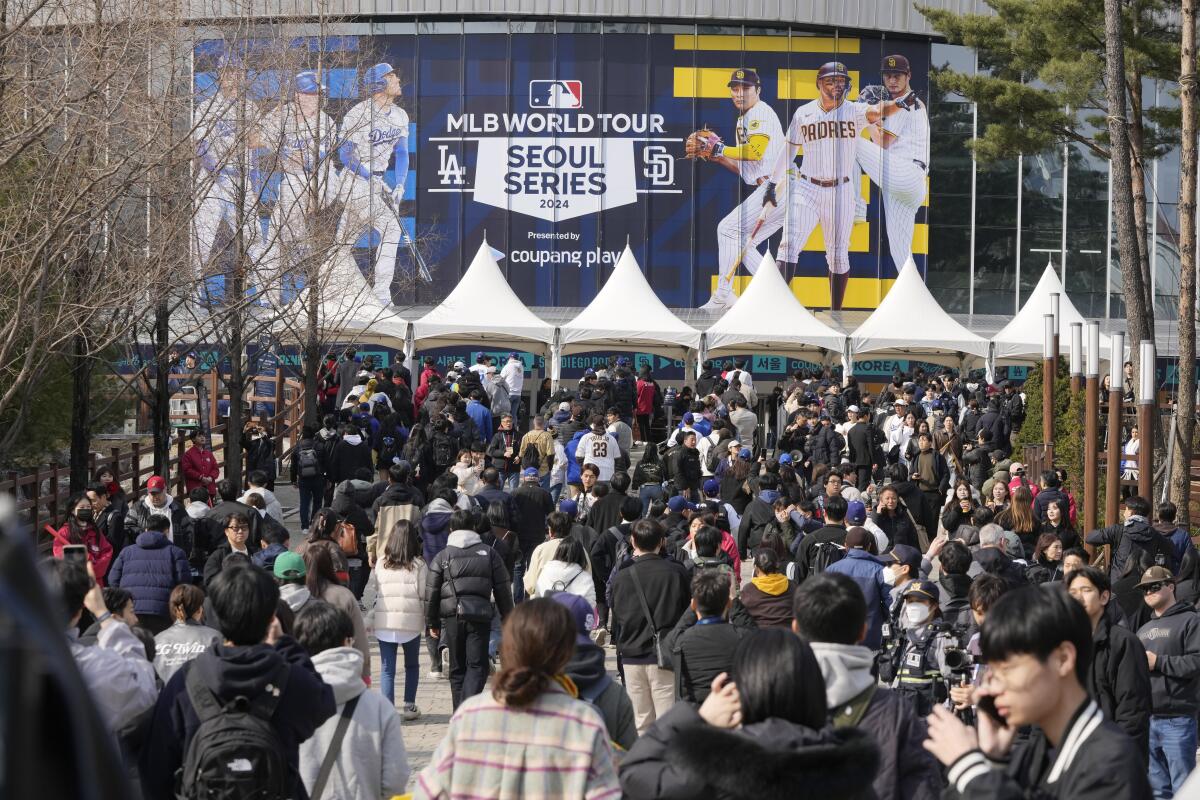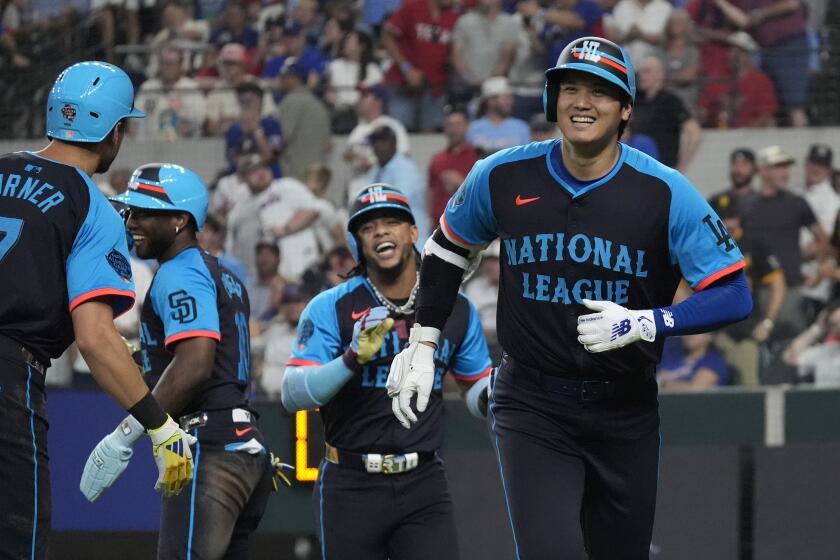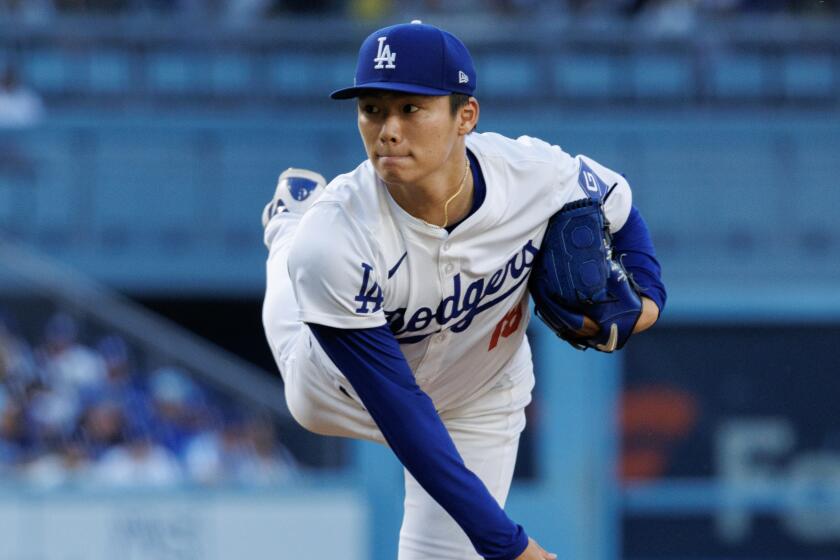Dodgers, Cubs to open 2025 season in Japan, Shohei Ohtani’s first MLB games in home country

When the Dodgers signed Shohei Ohtani this past offseason, it came with an assumption about their future schedule.
Major League Baseball was already planning to open its 2025 season with two games in Tokyo, Japan. Thus, the belief was that whichever team signed Ohtani, the two-time MVP and two-way Japanese star, would be one of the clubs picked to go.
On Thursday, that speculation became official, with MLB announcing that the Dodgers will face the Chicago Cubs in a two-game, regular-season series on March 18-19 at the Tokyo Dome in the opening games of the MLB season.
It means, for the first time since coming to MLB in 2018, Ohtani will play big-league games in his home country.
Shohei Ohtani says he’s embraced the expectations that surround the Dodgers and accepts that if they don’t win the World Series this year, they will have failed.
It also presents the opportunity for Ohtani, who is unable to pitch this season after undergoing Tommy John surgery last year, to potentially make his long-awaited return to the mound during the Tokyo games — perhaps, even, against Cubs ace and fellow Japanese star Shota Imanaga.
“I hope we’re included,” Dodgers manager Dave Roberts, who was born in Japan before moving to the U.S. as a young kid, said earlier this season of the Tokyo games. “Obviously, it would make a lot of sense.”
Indeed, the Dodgers and Cubs were the two most logical choices. Both are big-market franchises with international recognition. Both also have pairs of Japanese stars highlighting their rosters.
In addition to Ohtani, the Dodgers signed three-time Japanese league MVP Yoshinobu Yamamoto last winter. Before the Cubs signed Imanaga this past offseason, they inked Japanese outfielder Seiya Suzuki before the 2023 season.
The 2025 Tokyo series will be the sixth time that MLB has staged regular-season games in Japan — a country with a rich baseball history, a growing number of stars playing stateside, and an unmatched three titles in the World Baseball Classic.
It will mark the 25th anniversary of the league’s first Japanese games in 2000, when the Cubs and New York Mets met in the Tokyo Dome.
For the Dodgers, it will be the third time they play regular-season games overseas, after opening the 2014 season in Australia and this current campaign in South Korea. The club also played a series in Mexico in 2018.
For all that sentimentality, however, the trip figures to come with logistical hurdles for the Dodgers — who will become the first team in MLB history to open consecutive seasons with international trips.
Although players and coaches spoke glowingly of their South Korea experience in March — when they split a pair of games at the Gocheok SkyDome in Seoul — the 12,000-mile journey was nonetheless a taxing trek.
The team opened spring training five days earlier than the rest of the league, and had an abbreviated camp before flying to South Korea a week ahead of their series against the San Diego Padres.
When the club returned from the trip — in which they also dealt with an off-the-field crisis when Ohtani’s interpreter, Ippei Mizuhara, was discovered to have stolen money from the player to pay off gambling debts — it started the domestic portion of its schedule sluggishly, going just 11-10 in the next 21 games.
Recently, some club personnel have privately wondered how much the trip has contributed to the team’s wave of pitching injuries. The Dodgers entered the All-Star break with an MLB-most 12 pitchers on the injured list. And there has been some concern that the early start to camp, and trans-Pacific travel a week before the start of the domestic schedule, might have disrupted pitchers’ typical spring ramp-up process.
That, however, didn’t alter the long-anticipated plans to send the Dodgers to Japan.
The consecutive overseas trips were OK under MLB’s collective bargaining agreement, which only prevents teams from participating in more than one “special event” in the same season, or more than three total over the life of the deal (which runs from 2022 to 2026).
Why have the Dodgers been hit so repeatedly hard by the pitching injury bug? And when — and at what cost — is the right time to pursue potentially pricey reinforcements?
Tony Clark, the executive director of the Major League Baseball Players Assn., said in a February interview that the union wouldn’t object to the possibility of the trip either — though he also noted the MLBPA would ensure that “players are being put in a position where, from a health and safety standpoint, they are protected.”
“The league, based on the guardrails that are in the CBA, has the ability to … make a determination on the teams [that participate in the Japan games],” Clark said then. “Once that happens, then we engage to ensure that the players are positioned as best as possible to make sure they come out of the other side with a good experience. So we’ll see what happens there. But I can appreciate why this team, perhaps more so than some others, might be an interesting team to have.”
Clearly, there were no concerns from higher-ups in the Dodgers organization either.
The title sponsor for the 2025 Japan games?
Guggenheim, the Dodgers ownership group that spent more than $1 billion last offseason to ink Ohtani and Yamamoto — and all but assure the franchise would open its season overseas for a second straight year.
Other 2025 Dodgers schedule highlights
- March 27: Home opener, vs. Detroit Tigers
- May 16-18: Freeway Series at Dodger Stadium, vs. Angels
- May 30-June 1: New York Yankees visit Dodger Stadium
- June 9-11: First series vs. San Diego Padres, at Petco Park
- June 13-15: San Francisco Giants’ first visit to Dodger Stadium
- July 4-6: Houston Astros visit Dodger Stadium
- July 25-27: Series at Fenway Park vs. Boston Red Sox
- August 11-13: Freeway Series at Angel Stadium, vs. Angels
- Sept. 18-21: Final home series, vs. San Francisco Giants
- Sept. 28: Regular-season finale, at Seattle Mariners
More to Read
Are you a true-blue fan?
Get our Dodgers Dugout newsletter for insights, news and much more.
You may occasionally receive promotional content from the Los Angeles Times.













